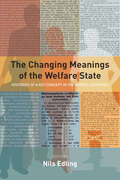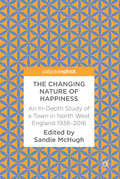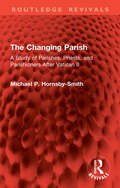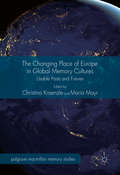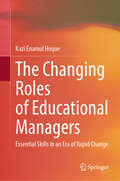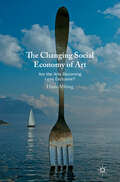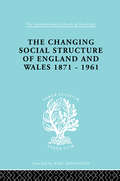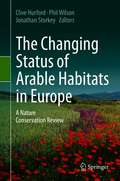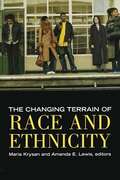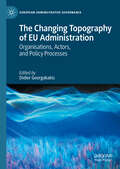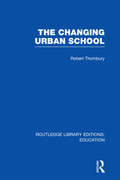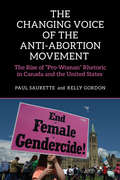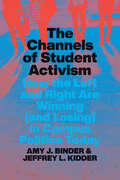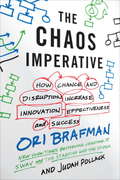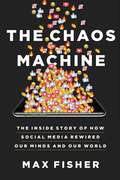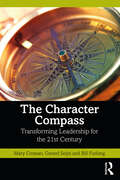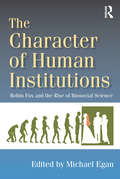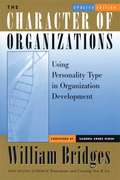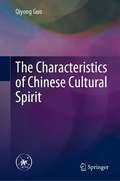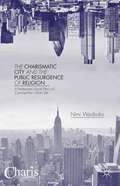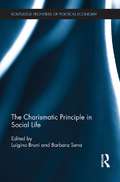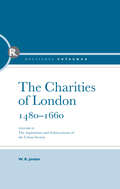- Table View
- List View
The Changing Meanings of the Welfare State: Histories of a Key Concept in the Nordic Countries
by Nils EdlingIn discussions of economics, governance, and society in the Nordic countries, “the welfare state” is a well-worn analytical concept. However, there has been much less scholarly energy devoted to historicizing this idea beyond its postwar emergence. In this volume, specialists from Denmark, Finland, Sweden, Norway, and Iceland chronicle the historical trajectory of “the welfare state,” tracing the variable ways in which it has been interpreted, valued, and challenged over time. Each case study generates valuable historical insights into not only the history of Northern Europe, but also the welfare state itself as both a phenomenon and a concept.
The Changing Nature of Happiness
by Sandie McHughThis book shines a light on the meaning of happiness and how public perceptions of it have changed over time. A question that has engaged philosophers from the days of Aristotle, happiness is a subject of growing academic interest, and its recent integration into government policy is provoking increased debate into its definition and nature. Sandie McHugh and her associates build on the work of social anthropologist Tom Harrison's 'Worktown' Mass Observation study from 1938, repeating the original study today. Together these accounts show how perceptions of happiness have changed over the years for the people of Bolton, UK, and reveal major difference between its definition then and now. This unique study is a useful tool in the understanding and study of happiness, offering invaluable insights for scholars and practitioners working in the fields of social psychology, positive psychology, health psychology and wellbeing.
The Changing Organization
by Paul Iles Kaijun Guo Maurice Yolles Gerhard Fink"The Changing Organization provides a multidisciplinary approach for studying the management of change under conditions of complexity. Single-discipline approaches frequently miss essential elements that reduce the possibility of coherence within a multi-agency organizational setting. Combining a systems and cybernetic 'living system' perspective, Guo, Yolles, Fink, and Iles offer a new agency paradigm designed to model, diagnose and analyse complex, real-world situations. Its capacity to anticipate patterns of behaviour provides useful means by which the origin of crises can be understood, and resolutions reflected upon. Scholars and graduate students in fields as diverse as management, politics, anthropology and psychology will find numerous applications for this book when considering socio-political and organizational change, and it offers an invaluable guide for consultants who may wish to apply advanced techniques of contextual analysis to real-world situations"--"'The Changing Organization' provides a multi-disciplinary approach for studying the management of change under conditions of complexity. Single-discipline approaches frequently miss essential elements that reduce the possibility of coherence within a multi-agency organizational setting. Combining a systems and cybernetic "living system" perspective, Guo, Yolles, Fink, and Iles offer a new agency paradigm designed to model, diagnose and analyse complex, real-world situations. Its capacity to anticipate patterns of behaviour provides useful means by which the origin of crises can be understood, and resolutions reflected upon. Scholars and graduate students in fields as diverse as management, politics, anthropology and psychology will find numerous applications for this book when considering socio-political and organizational change, and it offers an invaluable guide for consultants who may wish to apply advanced techniques of contextual analysis to real-world situations"--
The Changing Parish: A Study of Parishes, Priests, and Parishioners After Vatican II (Routledge Revivals)
by Michael P. Hornsby-SmithFirst published in 1989, The Changing Parish is the first modern sociological account of the changing Roman Catholic parish in England. It identifies the major changes in parishes and in the roles of parish priests and parishioners.At the heart of the book is a comparison of pre-Vatican and post-Vatican ideal types of Church, parish, priest, and parishioner. The author shows clearly, with special reference to two English parishes, how conflicts arise between those who favour the emergent models and those who adopt a posture of intransigence and adhere tenaciously to the earlier models. He explores these conflicts at parish level, particularly over the matter of liturgical reform, pointing out that such conflicts are not unique to England but can be detected in places as far apart as the United States, Australia, Western Europe, and the Philippines. Dr Hornsby-Smith gives a penetrating analysis of the changing nature of priest–lay relationships, styles of clerical leadership, and lay participation, and presents a systematic account of the everyday lives of the parish clergy.
The Changing Place of Europe in Global Memory Cultures
by Christina Kraenzle Maria MayrThis book investigates the transnational dimensions of European cultural memory and how it contributes to the construction of new non-, supra, and post-national, but also national, memory narratives. The volume considers how these narratives circulate not only within Europe, but also through global interactions with other locations. The Changing Place of Europe in Global Memory Cultures responds to recent academic calls to break with methodological nationalism in memory studies. Taking European memory as a case study, the book offers new empirical and theoretical insights into the transnational dimensions of cultural memory, without losing sight of the continued relevance of the nation. The articles critically examine the ways in which various individuals, organizations, institutions, and works of art are mobilizing future-oriented memories of Europe to construct new memory narratives. Taking into account the heterogeneity and transnational locations of commemorative groups, the multidirectionality of acts of remembrance, and a variety of commemorative media such as museums, film, photography, and literature, the volume not only investigates how memory discourses circulate within Europe, but also how they are being transferred, translated, or transformed through global interactions beyond the European continent.
The Changing Roles of Educational Managers: Essential Skills in an Era of Rapid Change
by Kazi Enamul HoqueThis book highlights the key competencies and coping mechanisms needed by educational managers in an era of rapid change on a national and international scale. It also posits and discusses how the heads of educational organizations, often classified as leaders, should be re-categorized as managers instead due to their broad range of duties and obligations. Finally, this book also provides a collection of essential tools, mechanisms, and principles for educational managers and practitioners at all levels in education.
The Changing Social Economy of Art: Are the Arts Becoming Less Exclusive?
by Hans AbbingIs art for everybody? Why do art lovers attach so much value to authenticity, autonomy and authorship? Why did the arts become so serious in the first place? Why do many artists reject commerce and cultural entrepreneurship? Crucially, are any of the answers to these questions currently changing? Hans Abbing is uniquely placed to answer such questions, and, drawing on his experiences as an economist and sociologist as well as a professional artist, in this volume he addresses them head on. In order to investigate changes in the social economy of the arts, Abbing compares developments in the established arts with those in the popular arts and proceeds to outline key ways that the former can learn from the latter; by lowering the cost of production, fostering innovation, and becoming less exclusive. These assertions are contextualized with analysis of the separation between serious art and entertainment in the nineteenth century, lending credence to the idea that government-supported art worlds have promoted the exclusion of various social groups. Abbing outlines how this is presently changing and why, while the established arts have become less exclusive, they are not yet for everybody.
The Changing Social Structure of England and Wales (International Library of Sociology)
by David MarshThis is Volume I of twenty-one in the Class, Race and Social Structure Series. Originally published in 1958, this is the second edition of a study that now focuses on the changing social structure of England and Wales between 1871 and 1961. The main object of this book, therefore, as it was in the first edition, is to introduce the student and the general reader to the maze of social statistics, which have become available, concerning the social structure of England and Wales. The emphasis throughout is on applied or descriptive statistics and a knowledge of statistical techniques therefore those (and they seem to be many) who have an instinctive dislike of mathematics need not be deterred from following the attempt which has been made to analyse the changing social structure with the aid of social statistics.
The Changing Status of Arable Habitats in Europe: A Nature Conservation Review
by Clive Hurford Phil Wilson Jonathan StorkeyThis edited volume documents the current nature conservation status of arable habitats in Europe. Arable farming systems have evolved in the European landscape over more than ten thousand years and now occupy nearly 30% of the European land area. They support species that have life cycles closely synchronised with traditional cereal growing, many of which have experienced massive declines throughout Europe. For example, in Britain, of the 100 plant species exhibiting the greatest declines in the latter half of the 20th century, 47 were typical of arable land. Despite this the habitat and many of the species associated with it remains unprotected across much of Europe. The 22 chapters cover a range of topics, including: · Regional accounts describing the impact of changing agricultural practices on the arable flora;· The results of research and surveillance projects on the soil organisms, bryophyte flora, invertebrate fauna and pollinators of arable habitats;· The potential for designing multifunctional and resilient agricultural landscapes; The use of ex situ conservation to aid the reintroduction of rare arable plants;· Case studies illustrating how changing agricultural practices have impacted on bird populations in Europe; · The roles of remote sensing in monitoring agricultural systems; · How agri-environment schemes can help restore the biodiversity in arable habitats; and · A look forward at ways to help ensure the future security of the species associated with arable habitats. It is clear that the biodiversity of arable land throughout Europe has undergone major changes, particularly during the second half of the 20th century, and that these changes are continuing into the 21st century. We need to develop a deeper appreciation of farmland wildlife and its integration into farming systems to ensure its future security in a world where value is increasingly expressed in terms of material profit. This book is particularly relevant to practitioners, policy-makers and managers working in the fields of nature conservation, agri-environment schemes and land management, and to researchers working in the fields of conservation biology, terrestrial ecology, nature conservation, applied ecology, biodiversity, agriculture, agricultural ethics and environmental studies.
The Changing Terrain of Race and Ethnicity
by Maria Krysan Amanda E. LewisThe legal institutions of overt racism in the United States have been eliminated, but social surveys and investigations of social institutions confirm the continuing significance of race and the enduring presence of negative racial attitudes. This shift from codified and explicit racism to more subtle forms comes at a time when the very boundaries of race and ethnicity are being reshaped by immigration and a rising recognition that old systems of racial classification inadequately capture a diverse America. In The Changing Terrain of Race and Ethnicity, editors Maria Krysan and Amanda Lewis bring together leading scholars of racial dynamics to study the evolution of America s racial problem and its consequences for race relations in the future. The Changing Terrain of Race and Ethnicity opens by attempting to answer a puzzling question: how is it that so many whites think racism is no longer a problem but so many nonwhites disagree? Sociologist Lawrence Bobo contends that whites exhibit what he calls laissez faire racism, which ignores historical and structural contributions to racial inequality and does nothing to remedy the injustices of the status quo. Tyrone Forman makes a similar case in his chapter, contending that an emphasis on color blindness allows whites to be comforted by the idea that all races are on a level playing field, while not recognizing the advantages they themselves have reaped from years of inequality. The book then moves to a discussion of the new ways that Americans view race. Eduardo Bonilla-Silva and Karen Glover argue that the United States is moving from a black-white divide to a tripartite system, where certain light-skinned, non-threatening minority groups are considered honorary whites. The book s final section reexamines the theoretical underpinnings of scholarship on race and ethnicity. Joe Feagin argues that research on racism focuses too heavily on how racial boundaries are formed and needs to concentrate more on how those boundaries are used to maintain privileges for certain groups at the expense of others. Manning Marable contends that racism should be addressed at an institutional level to see the prevalence of structural racism deeply entrenched patterns of inequality that are coded by race and justified by stereotypes. The Changing Terrain of Race and Ethnicity provides an in-depth view of racism in modern America, which may be less conspicuous but not necessarily less destructive than its predecessor, Jim Crow. The book s rich analysis and theoretical insight shed light on how, despite many efforts to end America s historic racial problem, it has evolved and persisted into the 21st century. "
The Changing Topography of EU Administration: Organisations, Actors, and Policy Processes (European Administrative Governance)
by Didier GeorgakakisThis book examines the ways in which the European Union’s administrative structures have changed over the last decade in response to several significant political events, including Brexit, the refugee crisis, and the Covid-19 pandemic. Whilst much has been written about the responses to these events at both national and European level, less attention has been given to the internal transformations they have brought about within the EU’s institutions. Multidisciplinary in approach, the book brings together leading scholars to assess the ways in which key organizations such as the European Council, the European Parliament and the European Central Bank have changed over the last ten years. It also throws light on the impact these events have had on policy actors within the EU administrative system, as well as its policy processes. It will appeal to all those interested in European public administration, political sociology, European politics, and EU studies.
The Changing Urban School (Routledge Library Editions: Education)
by Robert ThornburyThe author takes a long look at what goes on in schools, and the roles played by people specifically concerned with them: but finally the problems of the school are seen as indissolubly bound up with the changes that have overtaken urban life. The school cannot be isolated, teachers, administrators, planners and parents must actively co-operate in making the school work in society and a society which works for the school. Nothing other than such a total vision, he concludes, will enable us to achieve normal educational goals. Robert Thornbury writes out of fifteen years experience of the urban school and of the problems not only of Britain but also those sometime similar, often more acute, of other countries, in particular the United States and Australia. The need for a total urban strategy is worldwide. His point of view is broad-based but his sympathies lie most of all with the hard-working teacher who stayed on in the urban classroom. It is a book for teachers therefore, but also, by its own argument, for all concerned with the future of the inner-city and the reordering of education.
The Changing Voice of the Anti-Abortion Movement: The Rise of "Pro-Woman" Rhetoric in Canada and the United States
by Kelly Gordon Paul SauretteWhen journalists, academics, and politicians describe the North American anti-abortion movement, they often describe a campaign that is male-dominated, aggressive, and even violent in its tactics, religious in motivation, anti-women in tone, and fetal-centric in arguments and rhetoric. Are they correct?In The Changing Voice of the Anti-Abortion Movement, Paul Saurette and Kelly Gordon suggest that the reality is far more complicated, particularly in Canada. Today, anti-abortion activism increasingly presents itself as "pro-women": using female spokespersons, adopting medical and scientific language to claim that abortion harms women, and employing a wide range of more subtle framing and narrative rhetorical tactics that use traditionally progressive themes to present the anti-abortion position as more feminist than pro-choice feminism.Following a succinct but comprehensive overview of the two-hundred year history of North American debate and legislation on abortion, Saurette and Gordon present the results of their systematic, five-year quantitative and qualitative discourse analysis, supplemented by extensive first-person observations, and outline the implications that flow from these findings. Their discoveries are a challenge to our current assumptions about the abortion debate today, and their conclusions will be compelling for both scholars and activists alike.
The Channels of Student Activism: How the Left and Right Are Winning (and Losing) in Campus Politics Today
by Amy J. Binder Jeffrey L. KidderAn eye-opening analysis of collegiate activism and its effects on the divisions in contemporary American politics. The past six years have been marked by a contentious political atmosphere that has touched every arena of public life, including higher education. Though most college campuses are considered ideologically progressive, how can it be that the right has been so successful in mobilizing young people even in these environments? As Amy J. Binder and Jeffrey L. Kidder show in this surprising analysis of the relationship between political activism on college campuses and the broader US political landscape, while liberal students often outnumber conservatives on college campuses, liberal campus organizing remains removed from national institutions that effectively engage students after graduation. And though they are usually in the minority, conservative student groups have strong ties to national right-leaning organizations, which provide funds and expertise, as well as job opportunities and avenues for involvement after graduation. Though the left is more prominent on campus, the right has built a much more effective system for mobilizing ongoing engagement. What’s more, the conservative college ecosystem has worked to increase the number of political provocations on campus and lower the public’s trust in higher education. In analyzing collegiate activism from the left, right, and center, The Channels of Student Activism shows exactly how politically engaged college students are channeled into two distinct forms of mobilization and why that has profound consequences for the future of American politics.
The Channels of Student Activism: How the Left and Right Are Winning (and Losing) in Campus Politics Today
by Amy J. Binder Jeffrey L. KidderAn eye-opening analysis of collegiate activism and its effects on the divisions in contemporary American politics. The past six years have been marked by a contentious political atmosphere that has touched every arena of public life, including higher education. Though most college campuses are considered ideologically progressive, how can it be that the right has been so successful in mobilizing young people even in these environments? As Amy J. Binder and Jeffrey L. Kidder show in this surprising analysis of the relationship between political activism on college campuses and the broader US political landscape, while liberal students often outnumber conservatives on college campuses, liberal campus organizing remains removed from national institutions that effectively engage students after graduation. And though they are usually in the minority, conservative student groups have strong ties to national right-leaning organizations, which provide funds and expertise, as well as job opportunities and avenues for involvement after graduation. Though the left is more prominent on campus, the right has built a much more effective system for mobilizing ongoing engagement. What’s more, the conservative college ecosystem has worked to increase the number of political provocations on campus and lower the public’s trust in higher education. In analyzing collegiate activism from the left, right, and center, The Channels of Student Activism shows exactly how politically engaged college students are channeled into two distinct forms of mobilization and why that has profound consequences for the future of American politics.
The Channels of Student Activism: How the Left and Right Are Winning (and Losing) in Campus Politics Today
by Amy J. Binder Jeffrey L. KidderAn eye-opening analysis of collegiate activism and its effects on the divisions in contemporary American politics. The past six years have been marked by a contentious political atmosphere that has touched every arena of public life, including higher education. Though most college campuses are considered ideologically progressive, how can it be that the right has been so successful in mobilizing young people even in these environments? As Amy J. Binder and Jeffrey L. Kidder show in this surprising analysis of the relationship between political activism on college campuses and the broader US political landscape, while liberal students often outnumber conservatives on college campuses, liberal campus organizing remains removed from national institutions that effectively engage students after graduation. And though they are usually in the minority, conservative student groups have strong ties to national right-leaning organizations, which provide funds and expertise, as well as job opportunities and avenues for involvement after graduation. Though the left is more prominent on campus, the right has built a much more effective system for mobilizing ongoing engagement. What’s more, the conservative college ecosystem has worked to increase the number of political provocations on campus and lower the public’s trust in higher education. In analyzing collegiate activism from the left, right, and center, The Channels of Student Activism shows exactly how politically engaged college students are channeled into two distinct forms of mobilization and why that has profound consequences for the future of American politics.
The Chaos Imperative
by Ori Brafman Judah PollackIn the bestselling tradition of Switch and Made to Stick, Ori Brafman reveals how organizations can drive growth and profits by allowing contained chaos and disruption the space to flourish, generating new ideas that trigger innovation.In The Chaos Imperative, organizational expert and bestselling author Ori Brafman (Sway, The Starfish and the Spider) shows how even the best and most efficient organizations, from Fortune 500 companies to today's US Army, benefit from allowing a little unstructured space and disruption into their planning and decision-making.
The Chaos Machine: The Inside Story of How Social Media Rewired Our Minds and Our World
by Max FisherFinalist for the Helen Bernstein Book Award for Excellence in JournalismFrom a New York Times investigative reporter, this &“authoritative and devastating account of the impacts of social media&” (New York Times Book Review) tracks the high-stakes inside story of how Big Tech&’s breakneck race to drive engagement—and profits—at all costs fractured the world. The Chaos Machine is &“an essential book for our times&” (Ezra Klein). We all have a vague sense that social media is bad for our minds, for our children, and for our democracies. But the truth is that its reach and impact run far deeper than we have understood. Building on years of international reporting, Max Fisher tells the gripping and galling inside story of how Facebook, Twitter, YouTube, and other social network preyed on psychological frailties to create the algorithms that drive everyday users to extreme opinions and, increasingly, extreme actions. As Fisher demonstrates, the companies&’ founding tenets, combined with a blinkered focus on maximizing engagement, have led to a destabilized world for everyone. Traversing the planet, Fisher tracks the ubiquity of hate speech and its spillover into violence, ills that first festered in far-off locales, to their dark culmination in America during the pandemic, the 2020 election, and the Capitol Insurrection. Through it all, the social-media giants refused to intervene in any meaningful way, claiming to champion free speech when in fact what they most prized were limitless profits. The result, as Fisher shows, is a cultural shift toward a world in which people are polarized not by beliefs based on facts, but by misinformation, outrage, and fear. His narrative is about more than the villains, however. Fisher also weaves together the stories of the heroic outsiders and Silicon Valley defectors who raised the alarm and revealed what was happening behind the closed doors of Big Tech. Both panoramic and intimate, The Chaos Machine is the definitive account of the meteoric rise and troubled legacy of the tech titans, as well as a rousing and hopeful call to arrest the havoc wreaked on our minds and our world before it&’s too late.
The Character Compass: Transforming Leadership for the 21st Century
by Gerard Seijts Mary Crossan Bill FurlongA guide to transforming leadership for the 21st century, this is a book about a powerful and practical framework that leaders can use to help their organizations thrive, prosper, and improve the world around them: leader character. Developed through extensive research, teaching, and outreach over the past decade, leader character is the foundation that leaders rely upon to help them make their most critical judgments. This book carries forward the authors’ important work to the implementation stage on both the individual and organizational levels. Based on the authors’ interactions with organizations in the public, private, and not-for-profit sectors around the world, they offer practical roadmaps for implementing leader character in such areas as leadership development, strategy, manifesting purpose, culture-building, executive recruitment and HR practices, EDI, risk management, and other key corporate activities. The result of these implementations is nothing less than sustained organizational excellence. Leader character is the compass that helps leaders steer their organizations through real, positive, and lasting change. This actionable book will earn its place on the bookshelves of professionals and students in talent management, leadership development, HR, and organizational development, as well as leaders from the public, private, and not-for-profit sectors.
The Character of Human Institutions: Robin Fox and the Rise of Biosocial Science
by Michael EganThis volume celebrates the life and work of Robin Fox and the idea of a biosocial science. From his early studies of kinship, primates, the brain, evolution, the incest taboo, and aggression, to his later work on literature, politics, civilization, law, the Bible, Shakespeare, and the history of ideas, Robin Fox inspired many with an evolutionary vision of humanity that goes beyond narrow disciplinary boundaries and embraces the universal history of mankind. Fox's work represents an independent biosocial science stream of thinking that accepts the Darwinian mandate while avoiding reductionism by recognizing culture as a natural phenomenon. The essays cover Fox's life and his contributions, and address topics as diverse as the meaning and function of laughter; the unforgiving discipline of writing popular anthropology; extreme drinking rituals among young men training for the British army; Darwin and close-cousin marriage; the universal essence of the epic form as a super-attractor; anthropologists' autobiographies; the conflict between science and anti-science; and the decline of British imperial education. This engaging collection on a mainstream maverick has been edited by Michael Egan. It includes essays by Sir Antony Jay, Lionel Tiger, Howard Bloom, Michael McGuire, Kate Fox, Melvin Konner, Alan Macfarlane, Adam Kuper, Dieter Steklis, Alexandra Maryanski, Bernard Chapais, Jonathan Turner, Linda Stone, Charles Macdonald, Anne Fox, David Jenkins, Frederick Turner, Robert Trivers, and an essay by Robin Fox himself.
The Character of Organizations: Using Personality Type in Organization Development
by William Bridges Sandra Krebs HirshAn enormous consulting industry has sprung up promising to help organizations overhaul themselves to meet today's competitive pressures. Yet far too often, such change efforts fail. The solution, according to best-selling management author William Bridges, lies in identifying, understanding and working with what he calls organizational character. Just as people have personalities, Bridges explains, organizations - as well as their departments and teams - have characters. An organization's character shapes how decisions get made and new ideas are received, how employees are treated and change is accepted or rejected - all factors that affect company performance. Using examples from McDonald's, Hewlett-Packard, GE and other companies, Bridges identifies 16 organizational character types using the framework of MBTI© personality types and shows how these influence an organization's growth and development. With a foreword by Sandra Krebs Hirsh and a new preface by the author, this updated edition of the time-tested classic includes the Organizational Character Index, Bridges' popular tool for assessing the character of your own organization or team.
The Characteristics of Chinese Cultural Spirit
by Qiyong GuoThis book discusses issues like the characteristics of Chinese cultural spirit, life wisdom of Confucianism, Buddhism, and Daoism, the management wisdom of traditional Chinese culture, features of Chinese philosophy, as well as the definition of guoxue, or Chinese studies. Referring to previous research, the author defines the characteristics of the traditional Chinese cultural spirit as creating harmony amid diversity and viewing the outside world with a broad mind; being vigorous and self-motivated with tenacious vitality; taking benevolence and righteousness as supreme and being independent; considering people as the basis of the nation; thinking systematically and dialectically; and being pragmatic and thrifty. This book is beneficial to studies on cultural awareness, civilization comparison, as well as civilization exchange.
The Charismatic City And The Public Resurgence Of Religion
by Nimi WaribokoTwo powerful and interrelated transnational cultural expressions mark our epoch. They are Charismatic spirituality and the global city. This book offers a fresh and challenging articulation of the character of the charismatic renewal of Christianity in the framework of global cities, the socio-economic situation of poor urban residents, and urban space, resulting in a vision for the future city as a religious, ethical, and political space. The book studies the social, economic, and ethical implications of the charismatic renewal on urban living and urban design aimed at promoting human flourishing. From multidisciplinary perspectives Nimi Wariboko investigates the nature and impact of interreligious dialogues and encounters between charismatic Christianity and other religions in global cities.
The Charismatic Principle in Social Life (Routledge Frontiers of Political Economy)
by Luigino Bruni Barbara SenaMax Weber laid the foundations for the meaning of ‘charisma’ in modern secular usage. This new volume argues for the importance of the ‘charismatic principle’ in history, economics and society. This volume brings together a number of contributors at the cross section between economics, theology, sociology and politics in order to set a research agenda for the following issues: What does it means to have a ‘charism’? How does it work in society? How might one distinguish a ‘charism’ from a talent? Are ‘charism’s given only to "special" people, or are they also present in ordinary people? Is a ‘charism’ necessarily associated with religion, or, is it, as we submit, possible to imagine ‘charisms’ at work within a secular perspective? Which are the principle perspectives of the role of ‘charisms’ in social history? How have the ‘charisms’ of noted personalities (e.g., Benedict, Francis, Gandhi) changed economic and social history? What insights might be drawn from ‘civil charisms’ such as the cooperative movement, non-profit organizations, social economy, and values-based organizations? This book seeks to answer these questions through the employment of an interdisciplinary perspective, which examines the theme of the charismatic principle in social life in different fields of application.
The Charities of London, 1480 - 1660: The aspirations and the achievements of the urban society
by W. K. JordanIn this work, Professor Jordan continues his study of the origins of modern social and cultural institutions in England. He is concerned with the momentous shift which occurred in men's aspirations for their society in the course of the sixteenth and seventeenth centuries, as reflected in the charities which were established by gifts and bequests. This volume deals with the immense contribution made by London to this process of historical change, a change so swift as to be revolutionary in its institutional implications. The author describes the vast charitable system which London created, examines at length the aspirations and the social philosophy of the merchant aristocracy which controlled its affairs, and seeks to assess the social dominance exerted by London in this era as the flood of its charitable generosity poured out across the face of the realm. It is Professor Jordan's estimate that more than a third of the whole of the great charitable endowments created in England during this period were London's gift, while almost a third of London's benefactions were made for the benefit of communities in other parts of the realm. It is not too much to say that London's almost prodigal generosity was fashioning for all of England the institutions of a new age. Here is recorded the annal of a proud achievement by a city which discovered its own greatness in the period under discussion. It is perhaps not too much to say that few authors have quite so fully mastered the rich and variegated life and aspirations of the city as has Professor Jordan, certainly none have recounted the triumph of its achievement with greater understanding and pride. This book was first published in 1960.
